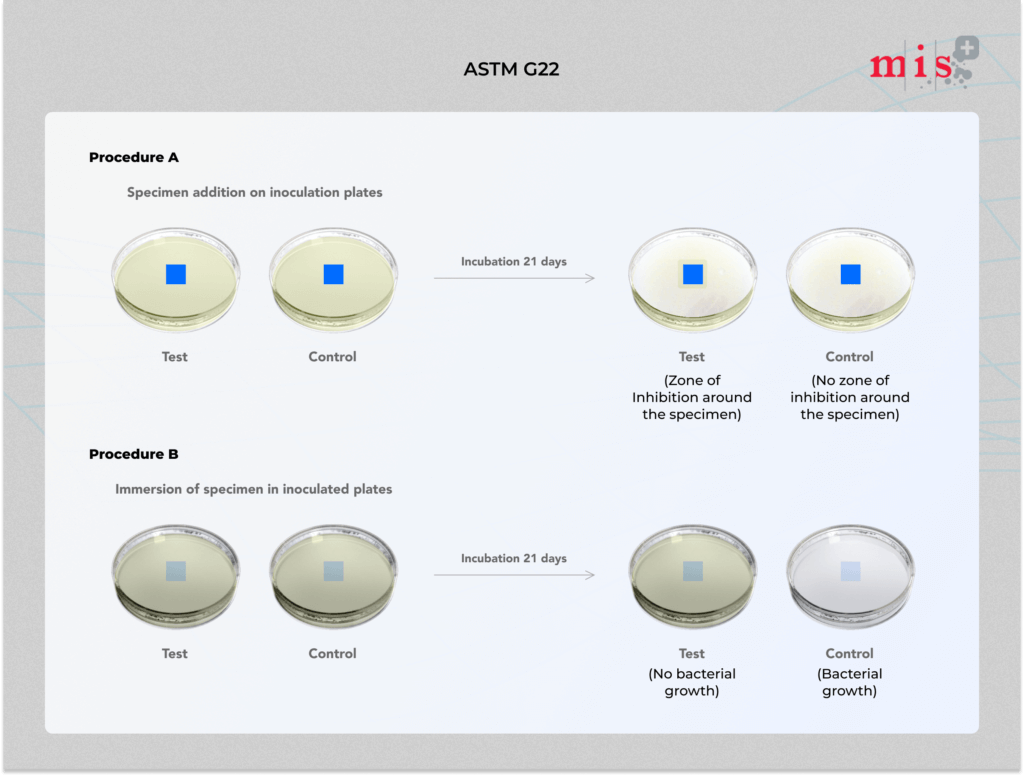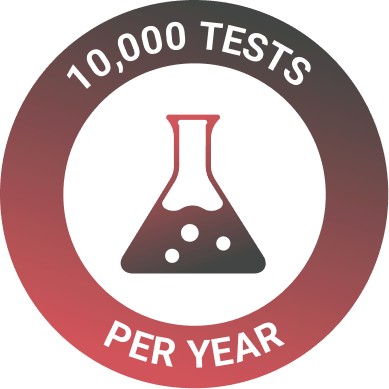Home >> Antibacterial >> ASTM G22
ASTM G22 : 1996 – Standard Method for Determining Resistance of Plastic to Bacteria
ASTM G22 test method is designed to determine the resistance of plastic materials impregnated with antibacterial agents.
Antimicrobial plastic materials have a range of benefits, such as providing antimicrobial protection, infection prevention, and preserving the durability and life span of material.
Thereby, antimicrobial testing is a crucial step to follow during manufacturing of antimicrobial plastic products to ensure the resilience of materials against harmful microorganisms before final applications.
ASTM G22 helps to determine if antimicrobial plastic material is capable of killing or hindering the growth of microorganisms under specific conditions.
Plastic materials that can be tested using ASTM G22 include,
- fabricated articles,
- tubes,
- rods,
- Sheets,
- coatings,
- and film materials.

ASTM G22 Test Method
ASTM G22 standard comprises two procedures, A & B for determining the efficacy of antibacterial-treated plastics. Pseudomonas aeruginosa (ATCC 15442) is a mandatory microorganism for performing the test.
- Procedure A – Test sample is placed on the surface of nutrient – salts agar plates that have been already inoculated with test microorganisms. Plates are examined for bacterial growth inhibition after 21 days of incubation.
- Procedure B – Herein, complete contact of the test sample and bacterial inoculum is achieved by placing the test sample sandwiched between the nutrient – salts agar pre-inoculated with test bacteria. Similar to procedure A, plates are examined for bacterial growth inhibition after 21 days of incubation.
Here at MIS, we develop and optimize test protocols for ASTM G22 which are complied with international standards. Test analysis is carried out in advanced laboratory setups by our microbiologists who have hands-on work experience and are well-versed with the techniques of data analysis and interpretation.
MIS also offers Antifungal Resistance Test – ASTM G21 for plastic and synthetic polymeric materials.
To request a quote on ASTM G22 and more information about our testing capacities, contact our experts here.



FAQs
ASTM G22 standard specifies a qualitative test method for determining the antibacterial resistance of additives impregnated in plastic materials.
ASTM G22 test is applicable to plastic materials available in different products forms such as fabricated articles, tubes, rods, sheets, coatings, and film materials.
ASTM G22 test takes 4-5 weeks to complete.
At Microbe Investigations, we test for ASTM G22 using the Pseudomonas aeruginosa (ATCC 15442). Additional strains can be added as per customer request.
Contact us for more information
Explore Other Tests
ASTME2149 | AATCC-100 | JISZ2801 | JISL1902 | EN 1276 | ISO 22196 | ISO 20743 | ISO 846 | ASTM E2180 | AATCC 147 | ASTM D7907-14 | ASTM E3031 | ASTM G29 | EN 16615 | EN 13697 | PAS 2424 | EN 1040 | EN 14349 | EN 13727 | EN 14561 | ASTM G22 | ASTM E1153 | ASTM D2574 | AATCC 174 | EN 14563 | EN 13704 | EN 1499 | EN 1500 | EN 14347 | EN 14348 | EN 1656 | EN 16437 | EN 12791 | ASTM E1174 | ASTM E2362
Antifungal Testing
AATCC 30 | ASTM G21 | EN 1650 | EN 1657 | EN 13624 | EN 1275 | ASTM C1338 | ASTM D5590



